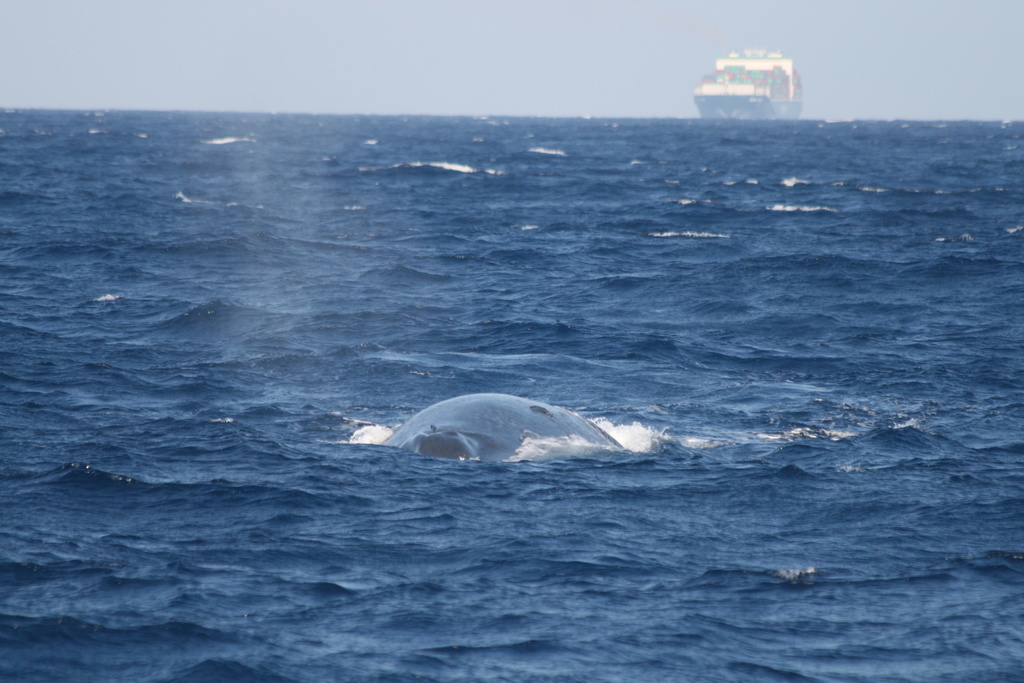21st Century Shipping
Avoiding a collision course to save whalesblue speeds: socioeconomic benefits of up to €4.5 billion a year from slowing down ships
blue speeds: socioeconomic benefits of up to €4.5 billion a year from slowing down ships

(Brussels, Belgium - 25 October 2022) – A small speed reduction for commercial ship speeds entering and leaving European Union waters could bring an estimated EUR€ 3.4-4.5 billion in socioeconomic benefits say the findings of an economic analysis conducted by independent research consultancy CE Delft for IFAW (International Fund for Animal Welfare), and presented today at the European Parliament.
The study also highlights that reducing the speed of all merchant ships utilising EU waters could have a sizable effect in reducing underwater noise from shipping, the risk of ships colliding with whales and greenhouse gas (GHG) emissions.
“Over the last several decades both underwater noise and GHG emissions from the shipping industry have been creeping up to unsustainable levels. Underwater noise pollution is detrimental to marine species, particularly marine mammals but also fish, crustaceans and invertebrates. Whales are also being killed in collisions with fast travelling ships,” explains Sharon Livermore, Director of Marine Conservation for IFAW.
“All of these threats can be reduced by lowering ship speeds—we call these ‘Blue Speeds’. Additionally, this new study shows that slightly reduced ship steaming has enormous economic benefits. The shipping industry benefits, people benefit from cleaner air and marine life will benefit from a healthier ocean. This is all achievable with a relatively small change.”
The economic study also found the EU can implement a limitation of ship speeds to 75% of ship design speed. This would allow a differentiated approach for each ship category that usually sail at different average speeds and are designed for specific speed windows. The study also shows that about 40% of all ship’s categories already sail at Blue Speeds, so at or below 75% design speed in European waters. Overall the average speed would have to be lowered by 5% on a fleet level.
“Such a comparatively small change for the shipping industry would have a significant positive impact on the environment. Therefore, we call on the EU institutions to adopt policies introducing Blue Speeds for commercial ships—an EU-wide measure for the implementation of slower ship speeds as a condition of entry into European ports. Join us in this call and sign our petition at www.bluespeeds.org,” adds Livermore.
MEPs César Luena (S&D) and Jutta Paulus (Greens) have hosted an event at the European Parliament today (25 October) during which CE Delft presented the findings of the economic analysis and IFAW its Blue Speeds campaign.
“Regulated ship speeds are a feasible way to address several threats to the ocean and marine life with one solution. This initiative would clearly be a good and timely contribution to the EU commitment to achieve Good Environmental Status in its waters,” said MEP César Luena, Vice-Chair of the Committee on the Environment, Public Health and Food Safety in the European Parliament.
“Shipping has a considerable impact on our ocean, but is also critical for the transportation of goods around the world. Until we have global regulations, the EU must show leadership and set an example of how to make shipping more sustainable,” said MEP Jutta Paulus, Member of the Committee on the Environment, Public Health and Food Safety in the European Parliament
Notes to editors:
Blue Speeds centers around finding the right pace. Blue Speeds (75% of design speed) actually only represents a small reduction in ship speeds compared to the current average. In fact, around half of ships already sail slower than Blue Speeds, and this speed ceiling would create a 'level playing field' for the industry, potentially incentivizing the shipping sector to slow down a bit. The speed reductions envisioned are very minor - if global shipping were to slow down by only around 10%, underwater noise pollution from shipping would immediately decrease by 40%. Shipping noise is known to impact marine life throughout the entire ocean food web, so reducing this pollutant would have far reaching benefits to whale and dolphin populations, fish and fisheries, and wider ocean ecosystem health. www.bluespeeds.org
For more information or to arrange interviews please contact:
Andreas Dinkelmeyer on mobile +49 (1520) 908 2258 or email adinkelmeyer@ifaw.org
Images are available on request.
About the International Fund for Animal Welfare (IFAW):
The International Fund for Animal Welfare is a global non-profit helping animals and people thrive together. We are experts and everyday people, working across seas, oceans and in more than 40 countries around the world. We rescue, rehabilitate and release animals, and we restore and protect their natural habitats. The problems we’re up against are urgent and complicated. To solve them, we match fresh thinking with bold action. We partner with local communities, governments, non-governmental organisations and businesses. Together, we pioneer new and innovative ways to help all species flourish. See how at ifaw.org
Related content
Press releases
EU fails to reduce ocean underwater noise while solutions already exist
Read morePress releases
Whale Sanctuary harpooned, Japan rebuked at Whaling Commission meeting
Read morePress releases
First Greek shipping company changes course for its ships to protect endangered whales in Hellenic Trench
Read moreOur work can’t get done without you. Please give what you can to help animals thrive.